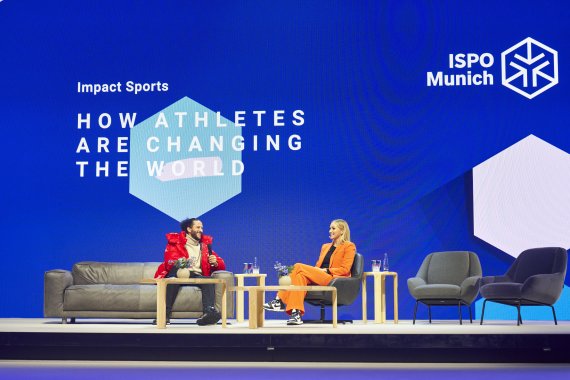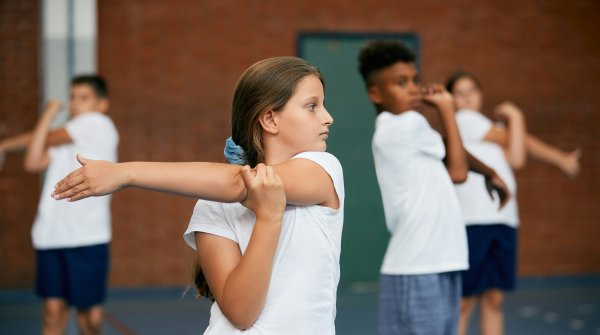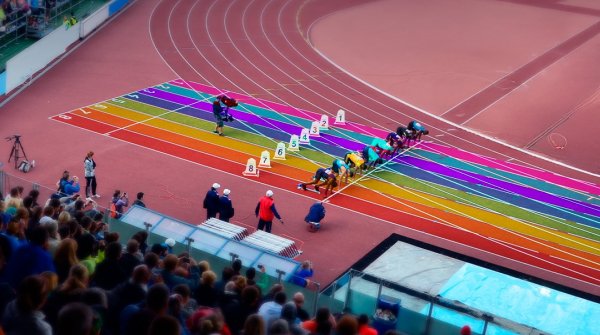- How do you separate private and professional life?
- How did the world react to your kneeling?
- Do we need more symbols as part of peaceful protest?
- Should athletes become more of a symbol?
- How can young athletes express their opinions?
- Is success a prerequisite for commitment?
- How do you deal with the responsibility that your reach brings?
- What do you think about resilience?
- You wrote a children's book, did this also focus on promoting self-confidence?
- How do we ensure that sport is not misused as a political tool?
- Do we need more corporate responsibility?
You definitely have to find a balance, because it takes up a lot of time. And it takes a lot of passion and work to get things started and make a difference. Finding time for my family - I have a daughter now - and enjoying that, but also being fully present here, is a super important balancing act for me. Whether I always manage the balance so well is another matter. But switching off and experiencing private moments often helps you to discover something new, for example to solve a problem you've been thinking about.
The support I received worldwide was incredible. To see footballers, cricketers, volleyball players and cheerleaders adopting the kneel as a symbol and the gesture spreading across the globe was incredible. Especially in view of the fact that the whole world has shown that it wants a better future. And that encouraged me, because others wanted the same thing as me and shared my vision. That also made it easier for me to keep fighting.
Part of me wishes we didn't need one at all. For me, that is also the goal we should be aiming for. But in the meantime, it's important to have these symbols along the way. Just think of people like Rosa Parks or Mohammed Ali, who have become beacons of hope. You think of them when you're trying to overcome hurdles or get through hard times. They are symbols. It's important to have these role models to lean on when you're struggling yourself.
Today and in the future, we will see more and more athletes taking a stand and making an impact in their communities and beyond. They have direct access and a direct connection to people. And they now also have a much more direct way of expressing their opinion or support than was perhaps the case in 2016. This has changed the overall dynamic.
Yes and no. You don't have to be the greatest at what you do to have an informed opinion on a topic that directly affects our society or a community. After all, you are part of it. But the reality right now is that some companies don't want to work with you if you're a troublemaker. Others see it as a leadership quality. Part of leadership is doing something uncomfortable that is best for the team or the company. To say "Oh, that's a troublemaker" instead of "Oh, that's a thought leader" is wrong thinking in my eyes. This mindset shift still has to take place in society.
The more reach you have, the more responsibility you bear. Regardless of whether you are aware of this or not. That's why it's really important to realize what effect a post has. I think a lot about how I can achieve the best result for everyone with what I do - versus what would be the best result for me personally. I try to be thoughtful with my posts.

For me, resilience is a matter of practice. Every time a problem arises, it's an opportunity to practice resilience. By breaking the issue down into individual moments, you also make it much more accessible. If you don't tackle it piece by piece, the issue becomes confusing and you don't know how to achieve resilience. That's why I see problems as an exercise. Overcoming an obstacle or two doesn't automatically make you resilient and more resilient. Being able to consistently say I can get through it and not let it stop me is more likely.
Definitely. I think it's extremely important to build up self-confidence - you could also say optimism - at a young age. And that's what I wanted to achieve with the book. In most situations, there is a way to win or get ahead. Having a stable foundation allows you to seize opportunities that will help you move forward instead of just looking at the problem. The problem only gives you a framework, but the right mindset gives you the opportunity to get through, to overcome the problem - be it under, over, to the side or whatever.
I've had to deal with it since I was a child. Especially in sports: you lose, you get humiliated, you have terrible days. Can you build resilience and confidence from that and turn up to the next training session or game and be better than the last? Very often sport puts you in situations that embarrass you publicly and humiliate you - especially when you're young. I'm sure many of us now have scenes like that in our heads and think "oh, that was terrible". Because often the defeats or bad moments are much more present in our minds. Coming back from that, moving on and being stronger on the field or court the next time gives you a resilience that you can build on not only in sport, but in all areas of life.
Athletes are in a unique position to bring the elements of sport to life. But at the same time, it is the responsibility of fans or communities to show organizations what is important to them. Then organizations must respond. Because without fans, supporters or athletes, it doesn't work. So the responsibility to create a better future lies with all of us. Athletes naturally have an important external impact. They can initiate things and get fans and communities to join in - and thus become a movement.
Internationally, I'm not so sure, but a lot was initially initiated in the USA, mainly through marketing and PR. But much of this has faded or disappeared completely. Initiatives for equality and diversity have been dismantled and jobs have been cut. So there is still a lot to do. However, customers, fans and communities can play a role again. Because they decide for themselves which brands they support - depending on who represents their values. Brands that make a statement and do it well have a huge advantage over other companies. Conversely, this has a cultural and social impact as well as a business impact. The more companies that understand this, the better. If we all pull together - athletes, brands and fans - we can use sport to change the future faster and have a bigger impact than we think. And that in turn benefits us all.
- ISPO awards
- Mountain sports
- Bike
- Design
- Retail
- Fitness
- Health
- ISPO Job Market
- ISPO Munich
- ISPO Shanghai
- Running
- Brands
- Sustainability
- Olympia
- OutDoor
- Promotion
- Sports Business
- ISPO Textrends
- Triathlon
- Water sports
- Winter sports
- eSports
- SportsTech
- OutDoor by ISPO
- Heroes
- Transformation
- Sport Fashion
- Urban Culture
- Challenges of a CEO
- Trade fairs
- Sports
- Find the Balance
- Product reviews
- Newsletter Exclusive Area
- Magazine








